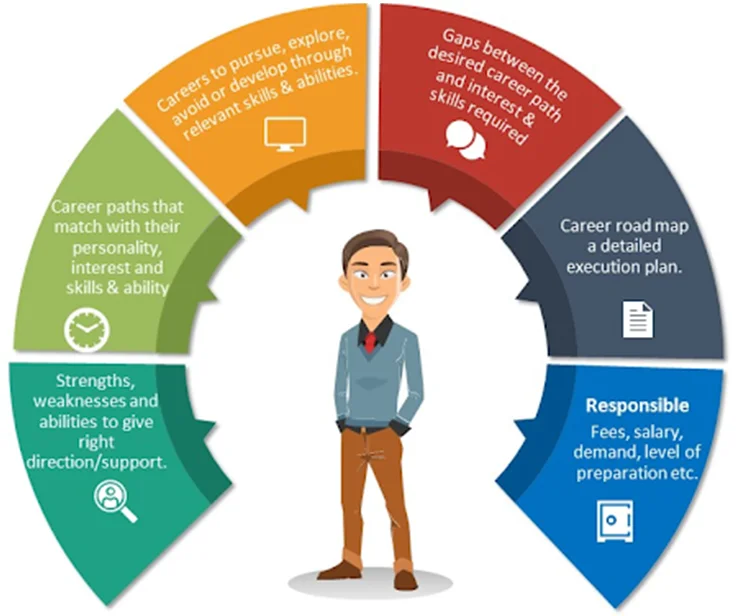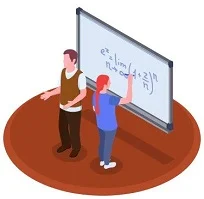


The term "guidance" dates back to the 16th century, referring to the act of directing conduct. Career guidance, in essence, is a structured program designed to help individuals make informed decisions about their education and careers. It is a journey of self-discovery and growth, enabling individuals to make mature and informed choices.
Career guidance involves providing individuals with the necessary knowledge, skills, and experience to identify and narrow down career options, ultimately leading to a career decision that positively impacts their social, financial, and emotional well-being.

Career counsellors assist individuals in setting career goals and developing concrete action plans to achieve them. This includes identifying potential obstacles and creating strategies to overcome them. They may also provide resources for further education or training, job search techniques, resume writing, and interview preparation to enhance employability. Career counsellors offer ongoing support and encouragement throughout the career exploration and decision-making process, recognizing that career paths may evolve over time.
Tools like aptitude tests, IQ tests, and interest assessments are used to understand the individual. Based on these reports, the counsellor works with the person to discover suitable career options. From choosing the right academic path, such as the appropriate board or course, to selecting the right job, the advisor guides the individual in planning the entire pathway to their desired career goal.
Career guidance for students in Class 8th and 9th helps identify suitable careers that match their skills, interests, and personality traits. It provides accurate information about different career options and job market trends, assisting in developing clear and achievable career goals. This process can help students make informed decisions about their future paths by understanding their strengths, values, and aspirations in relation to various career requirements.
After 10th grade, career guidance enables students to make informed career choices by weighing their values, interests, aptitudes, abilities, and aspirations against those required for various careers. This helps them find the right path that aligns with their skills and interests while preparing them for the future. Career guidance at this stage ensures students choose careers that match their abilities, reducing the risk of career dissatisfaction and increasing their chances of success by providing additional support as needed.
Career counselling for students after 12th, career guidance provides detailed information on different careers, including necessary qualifications, skills, and salaries. Based on the gathered information, it encourages critical thinking skills to plan their education paths. Career guidance at this stage increases students' chances of success by ensuring clear paths and providing additional support required to achieve their goals. Students can make informed decisions about their future paths by understanding various career options and their requirements.
For graduates, career guidance is crucial for mapping out new career paths and identifying the necessary skills and training required for these new roles. It assists individuals who have lost their jobs in mapping out what to do next and assessing their financial situation, providing a structured approach to finding new career opportunities. Career guidance at this stage enhances employability by helping individuals develop the necessary skills, knowledge, and experience to succeed in their chosen careers. It also aids in networking and connecting with industry veterans, opening doors of opportunities and helping overcome obstacles.
Career guidance helps individuals identify suitable careers that match their skills, interests, and personality traits. It provides accurate and up-to-date information about different career options, job market trends, and educational requirements, enabling people to make informed decisions about their future. Career guidance also assists in developing clear and achievable career goals, enhancing employability, and overcoming career obstacles. By providing guidance from professional coaches, understanding job market trends, and enhancing career planning and growth, career guidance can unlock potential, improve self-esteem and confidence, and increase chances of success.

Often, it has been witnessed that students enrol for a course not knowing exactly what it offerers. Their fancy names, peer pressure and popularity, push the student to opt for the course. However, many parents see the need for guidance and career counselling, and a few still force their children to opt for conventional and money-making careers. Professional courses offered in fields like engineering, psychology, commerce, humanities, science and the rest demand specific skill sets.
For example
An individual wanting to pursue a career as an engineer should have the following skill to be needed for eligible for the post.

Aptitude for Mathematics

Analytical Skills

Complex Problem Solving Skills

Science and Computing Knowledge
Thus, the role of an educational counsellor is to assist the student in choosing the right course that matches the student's skillsets to maximise satisfaction and performance.
There are various standardized tools for assessment used by various counselling centres. Depending upon the client's needs, appropriate Psychometric tests are chosen to evaluate the client's Interests, Aptitude and Personality. Assessment tools like 16PF, Big 5, DBDA, Bhatia, DAT, and Wechsler Intelligence Scale are the most used in India. Various genuine online portals also offer online counselling and assessment. These online portals may further connect you to expert online career counselling counsellors.

108+ Career Counselling Centres in India with Global Centres
Career Guidance in India is gaining momentum; with the increase in awareness of the importance of career counselling amongst the parent population, more and more parents have voluntarily enrolled their children on career counselling. Schools, colleges and educational institutes also encourage students to do career counselling. The Government also emphasizes providing compulsory career counselling and guidance to the students at the school level to help them chart a proper career path and choose. Mumbai, Banglore, Delhi and Pune have the highest number of career counselling centres.


DMIT Dermatoglyphics Multiple Intelligence test (DMIT) is the latest and most trending way of mapping a person's brain. In DMIT, the fingerprints of the client are taken using a scanner, and then a report is generated that gives complete details of the client's personality, strengths, weaknesses and potential. Research suggests 85% accuracy for this approach. It is considered more effective than any psychometric test. Counselling done on the basis of fingerprint reports gives a clearer picture to the students to choose a career option based on their abilities and skill sets. In India, Brainwonders is the largest DMIT and career counselling centre, with 108 branches all across the country.

Career Guidance is the guidance given to individuals to aid them in understanding their skills, abilities and potential that is important for choosing the right career path.
Career guidance after 10th and career guidance after 12th are very important as these are the crucial turning points in a student's life.
Professional career guidance counsellors provide career guidance and counselling to students who need clarification as to what career choice to make. Brainwonders career counsellors are qualified career guides who help students understand their innate abilities and skills through various career guidance test such as Aptitude test and interest test. They also help students choose the right career path.